Despite a series of setbacks for Kurds in 2018, a Kurdish national awakening has begun, with Turkish Kurds positioned to take a lead role, Henri Barkey, a professor of international relations, said in an analysis for Foreign Affairs.
U.S. President Donald Trump’s December announcement that U.S. forces would be pulling out of Syria came as a shock for the main U.S. ally in the fight against the Islamic State (ISIS), the Syrian Kurdish fighters of the People’s Protection Units (YPG).
It also came at the end of a particularly tough year for Kurds across the Middle East, Barkey, adjunct senior fellow for Middle East Studies at the Council on Foreign Relations, wrote in the U.S. magazine.
After Iraqi Kurds voted for independence in September 2018, the Iraqi government, backed by Iran and Turkey, invaded Iraqi Kurdistan and conquered 40 percent of its territory. The Kurdistan Regional Government, or KRG, lost much of its international influence as a result, said Barkey.
Turkish Kurds gained seats in parliament in June 2018, yet endured relentless assaults from the government of President Recep Tayyip Erdoğan, including a renewed military campaign against the Kurdistan Workers’ Party (PKK), a left-wing separatist group that has fought a decades-long insurgency in Turkey.
The YPG had played the central role in largely defeating ISIS and looked set to become a significant actor in negotiations to end Syria’s war. But Turkey invaded the Kurdish-controlled town of Afrin in March 2018, displacing the YPG and some 200,000 local Kurds. Then came the news that the Syrian Kurds’ American protectors would be leaving.
Still, all of this goes against a broader trend, Barkey said.
“Across the region, Kurds are gaining self-confidence, pushing for long-denied rights, and, most important, collaborating with one another across national boundaries and throughout the diaspora,” he said. “To a greater extent than at any previous point in history, Kurds in the four traditionally distinct parts of Kurdistan—in Iran, Iraq, Syria, and Turkey—are starting down the road of becoming a single Kurdish nation.”
Some 30 million Kurds live in a contiguous region stretching across southeastern Turkey, northwestern Iran, northern Iraq, and northeastern Syria. Modern Kurdish nationalism has its roots in the dissolution of the Ottoman Empire after World War I. The 1920 Treaty of Sèvres, signed between the Allies and the defeated Ottomans, called for an independence referendum in the Kurdish-majority areas of modern-day Turkey, according to Barkey.
Barriers remain, including linguistic divisions and two strong states standing against pan-Kurdism; Iran and Turkey. Yet Kurdish nation building may ultimately prove difficult to contain.
“Even if there is never a single, unified, independent Kurdistan, the Kurdish national awakening has begun,” said Barkey. “The Middle East’s states may fear the Kurdish awakening, but it is beyond their power to stop it.”
Kurds have made great progress in Turkey despite recent troubles. Erdoğan’s efforts to sabotage the pro-Kurdish People’s Democratic Party (HDP) —imprisoning candidates, imposing media blackouts, and harassing Kurdish voters— have not prevented the party from entering the Turkish parliament in three successive elections, said Barkey. Many politicians, including the party’s co-leader, Selahattin Demirtaş, are even now languishing in jail.
A new constitution has transformed Turkey into a presidential system and neutered its parliament. So HDP influence, like that of other opposition parties, has been greatly limited. Yet the fact that the HDP came in third in the June 2018 elections, behind only the ruling Justice and Development Party (AKP) and the main opposition Republican People’s Party (CHP), is an indication that the Kurdish issue has been institutionalised in Turkish politics, according to Barkey.
The HDP’s success will encourage the mobilisation of Kurdish civil society and ties with others in the Turkish opposition, while the proliferation of Kurdish organisations in Europe may move European attitudes toward Turkey in a more pro-Kurdish direction, he said.
“It is the Turkish Kurds who, although divided between a military wing (the PKK) and a political wing (the HDP), are in the best position to assume a leadership role for Kurds across the region,” Barkey wrote. “This is because they, unlike the other Kurdish communities, are part of a country embedded in Western institutions. Even if Turkey’s practices diverge from Western norms, Turkish Kurds have benefited from exposure to the values and principles associated with the West.”
THe United States remains the single most important outside actor when it comes to determining the future of the Kurds. The U.S. withdrawal will force Syrian Kurds to negotiate with Damascus earlier than they had planned, and could cause a destabilizing scramble among regional powers in Syria, with disastrous results for the Kurds, according to Barkey.
“Washington will have to employ all its persuasive powers to ensure that the Kurds are not crushed by Ankara, Damascus, and other regional powers,” wrote Barkey.
Source: Ahval News



